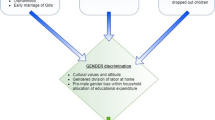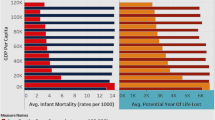Abstract
It has been widely assumed that South Africa has achieved universal basic education. Through an analysis of the 2001 census and two national enrolment datasets rather than statistical projections, this study re-examines this assumption and provides new estimates of enrolment levels in primary, basic and secondary education. Using GER, NER, and ASER indicators, disaggregated by gender and province, the study shows that access to education in South Africa is not as widespread as published sources note. While statistics show that national access levels are lower than prevailing estimates, the relatively high levels of access in some of the most disadvantaged provinces suggest the need to re-evaluate assumptions about targets for universal access for developing regions. In addition, the analysis reveals South Africa’s unexpected and provocative gendered patterns of access and participation.
Zusammenfassung
ALLGEMEINER ZUGANG ZU SCHULBILDUNG IN SÜDAFRIKA: EINE LÜCKE WIRD GESCHLOSSEN – Es besteht gemeinhin die Ansicht, dass in SÜdafrika ein allgemeiner Zugang zu schulischer Grundbildung bestehe. Die vorliegende Studie ÜberprÜft diese Annahme, wobei sie sich anstelle statistischer Überschlagswerte einer Analyse der Volkszählung von 2001 und zweier landesweiter Einschreibungsdatensätze bedient. Sie kommt im Ergebnis auf eine neue Einschätzung der Teilhabe an Grund-, Haupt- und Sekundarbildung. Die Studie verwendet GER, NER und ASER Indikatoren, differenziert nach Geschlecht und Wohngebieten, und belegt, dass Bildungszugänge in SÜdafrika weniger verbreitet sind als die Quellenpublikationen es darlegen. Während die Statistiken im Vergleich zu frÜheren Schätzungen landesweit niedrigere Zugangslevel aufzeigen, rufen die relativ hohen Zugangslevel gerade in einigen besonders benachteiligten Provinzen zu einer Neubewertung der Zielorientierung von Bildungszugängen in Entwicklungsgebieten auf. Zusätzlich werden durch die Analyse unerwartete und provozierende Geschlechterdifferenzen im Zugang zur Teilhabe an Bildung offenbar.
Résumé
ACCÈS GÉNÉRALISÉ Á L’INSTRUCTION EN AFRIQUE DU SUD: COMBLER LE FOSSÉ – on a prÉsumÉ que l’Afrique du Sud avait largement atteint l’objectif d’une Éducation gÉnÉralisÉe de base. Á travers une analyse du recensement de 2001 et de deux ensembles de donnÉes d’inscriptions nationales plutôt que par le biais de projections statistiques, cette Étude rÉexamine cette prÉsomption et fournit de nouvelles Évaluations des niveaux d’inscription dans l’Éducation primaire, de base et secondaire. En utilisant des indicateurs GER, NER, et ASER, rÉpartis par sexe et par province, l’Étude prouve que l’accÈs à l’Éducation en Afrique du Sud n’est pas aussi rÉpandu que les sources publiÉes ne le notent. Tandis que les statistiques prouvent que les niveaux d’accÈs nationaux sont infÉrieurs aux Évaluations prÉdominantes, les niveaux d’accÈs relativement ÉlevÉs dans certaines des provinces les plus dÉsavantagÉes suggÈrent la nÉcessitÉ de rÉÉvaluer les suppositions quant aux objectifs visant un accÈs gÉnÉralisÉ pour les rÉgions en voie de dÉveloppement. En outre, l’analyse rÉvÈle la dimension inattendue et provocatrice des modÈles d’accÈs et de participation de l’Afrique du Sud reposant sur une diffÉrenciation sexuelle.
Resumen
ACCESO UNIVERSAL A LA FORMACIÓN ESCOLAR EN SUDÁFRICA: CERRANDO UN VACÍO – Existe una suposiciÓn generalizada de que SudÁfrica ha logrado una educaciÓn bÁsica para todos. Mediante el anÁlisis del censo de 2001 y de dos conjuntos de datos sobre matriculaciÓn, y no tanto de proyecciones estadÍsticas, este estudio revisa esa suposiciÓn y provee nuevas cifras estimativas en cuanto a niveles de matriculaciÓn en la educaciÓn primaria, bÁsica y secundaria. Utilizando los indicadores de TBE (tasa bruta de escolarizaciÓn), TNE (tasa neta de escolarizaciÓn) y ASER (Annual Status of Educational Report o informe anual sobre estado y situaciÓn del sistema educativo), disgregados por géneros y provincias, el estudio muestra que el acceso a la educaciÓn en SudÁfrica no presenta la amplitud percibida por las fuentes publicadas. Mientras que las estadÍsticas indican que los niveles nacionales de acceso escolar son inferiores a las estimaciones generales, los niveles relativamente altos de acceso en algunas de las provincias mÁs desaventajadas sugieren la necesidad de reevaluar las suposiciones relacionadas con los objetivos de acceso universal para las regiones en vÍas de desarrollo. AdemÁs, el anÁlisis revela modelos inesperados y provocantes en cuanto al acceso y la participaciÓn relacionados con los géneros.

Similar content being viewed by others
References
Bot, Monica, Jennifer Shindler 1997. Education 2000 Plus Macro Indicators, Report on Baseline Data: 1991–1996. Johannesburg: Centre for Education Policy Development, Evaluation and Management
Bot, Monica, Daniel Wilson, Sandy Dove 2000. The Education Atlas of South Africa 2000. Johannesburg: Education Foundation
Budlender, Debbie. 1991. Women and the Economy. Braamfontein: Community Agency for Social Enquiry
Budlender, Debbie, and Ros Hirshowitz. 2003. Education Data and the 1996 Census. EduSource Data News 25/July
Colclough, Christopher, Keith Lewin 1993. Educating all the Children: Strategies for Primary Schooling in the South. Oxford: Claredon Press
Crouch, Luis. 1999. Education and the 1996 Census: Some Crucial Apparent Problems and Possible Strategies for Resolution. EduSource Data News 24/March
Department of Education. Undated (a). Education for All Status Report 2002 Incorporating Country Plan for 2002–2015. Pretoria: Government Printers
Department of Education. Undated (b). Report on the School Register of Needs 2000 Survey. Pretoria: Government Printers
Department of Education. 1995. White Paper on Education and Training. Government Gazette 357 (16312). Pretoria: Government Printers
Department of Education. 1998. Age Requirements for Admission to an Ordinary Public Government School. Government Gazette, Government Notice No 2433 of 1998, Pretoria: Government Printers
Department of Education. 2003a. Report to the Minister. Review of the Financing, Resourcing and Costs of Education in Public Schools. 3 March. Pretoria: Government Printers
Department of Education. 2003b. Education Statistics in South Africa at a Glance in 2001, June. Pretoria: Government Printers
Department of Education. 2004a. Annual School Survey Database 2001. Pretoria: Government Printers
Department of Education. 2004b. Snap Survey Database 2001. Pretoria: Government Printers
Department of Education. 2005. Education Statistics in South Africa at a Glance in 2003, May. Pretoria: Government Printers
Department of Education. 2006a. South African Schools Act (84/1996): Amended National Norms and Standards for School Funding. Government Gazette No. 29179. Pretoria: Government Printers
Department of Education. 2006b. South African Schools Act (84/1996). Regulations Relating to the Exemption of Parents from Payment of School Fees in Public Schools. Government Gazette No. 29311. Pretoria: Government Printers
Fataar, Aslam 1997. Access to Schooling in Post-apartheid South Africa: Linking Concepts to Context. International Review of Education 43(4): 331–348
Fleisch, Brahm, Stu Woolman 2004. The Constitutionality of School Fees: A Qualified Defence. Perspectives in Education 22(1): 111–123
Fleisch, Brahm. 2006. Bureaucratic Accountability in the Education Action Zones of South Africa. South African Journal of Education 26(3): 369–382
Hawes, Hugh 1983. Once More unto the Breach Dear Friends. International Review of Education 29(2): 133–137
Human Rights Watch. 2004. Forgotten Schools: Rights to Basic Education for Children on Farms in South Africa, 16 (7)a, May. http://www.hrw.org/reports/2004/southafrica0504 accessed September 14, 2005
Interview with Dr Christo Lombaard, EMIS Unit, Department of Education, 18␣August 2004
Macdonald, Carol 1990. Crossing the Threshold into Standard Three. Pretoria: Human Sciences Research Council
Perry, Helen, and Fabian Arends. 2004. Public Schooling. In: Human Resources Development Review 2003: Education, Employment and Skills in South Africa, ed. by Andre Kraak. Cape Town: HSRC Press
Porteus, Kimberley, Glynis Clacherty, Leon Mdiya 2000. Understanding Out-of-school Children and Out-of-age Learners in the Context of Urban Poverty in South Africa. Johannesburg: Vuk’uyithathe Research Consortium
Porteus, Kimberley. 2003. Pushing the “Problems” Underground? Left-behind Learners in South Africa. http://www.id21.org/insights-ed02/insights-issed02-art03.html (Retrieved 17/6/04)
Republic of South Africa. 1993. The Constitution of the Republic of South Africa, Act 200 of 1993. Pretoria. Government Printers
Republic of South Africa. 1996. South African Schools Act, Act 84 of 1996. Pretoria:Government Printers
Shindler, Jennifer. 2004. An Analysis of the 2003 Senior Certificate Examination. EduSource Data News, 43/May
Shindler, Jennifer. 2005. Access to and Participation in Education in South Africa: A␣Quantitative Analysis. M Ed Research Report. University of the Witwatersrand
Statistics South Africa. Undated. http://www.statssa.gov.za/SpecialProjects/Census2001/Census/Dialog/statfile.asp accessed September 3, 2004
Statistics South Africa, 2003a. Census 2001 Community Profile Database. Pretoria: Government Printers
Statistics South Africa. 2003b. General Household Survey July 2002. Statistical Release P0318. 15 December. Pretoria: Government Printers
Simkins, Charles. 2002. The Jagged Tear: Human Capital, Education and AIDS in South Africa, 2002–2010. CDE Focus, 7, March
UNESCO. 2002. EFA Global Monitoring Report 2002. Education for All: Is the World on Track? Paris
UNESCO. 2004. EFA Global Monitoring Report 2005. Education For All: The Quality Imperative. Paris
UNESCO. 2005. EFA Global Monitoring Report 2006. Literacy for Life. Paris
Williams, Peter 1983. The Last Ten Percent. International Review of Education 29(2): 159–163
World Bank. 2004. Data and Statistics, Country Classification. http://www.worldbank.org/data/countryclass/classgroups.htm#Lower_middle_income accessed February 19, 2005
Author information
Authors and Affiliations
Corresponding author
Rights and permissions
About this article
Cite this article
Shindler, J., Fleisch, B. Schooling For All In South Africa: Closing The Gap. Int Rev Educ 53, 135–157 (2007). https://doi.org/10.1007/s11159-007-9038-z
Received:
Accepted:
Published:
Issue Date:
DOI: https://doi.org/10.1007/s11159-007-9038-z




